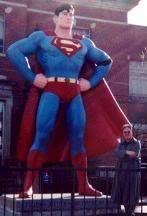| Pop Culture Gadabout | ||
|
Tuesday, February 22, 2005 ( 2/22/2005 10:38:00 AM ) Bill S. "COUNTING YOUR CHICKENS GATHERS NO MOSS!" – My main memories of comedian Ed Wynn are of a giggly old geezer in sixties era Disney movies (laffing on the ceiling in Mary Poppins, twittering around in Babes in Toyland), so it was with a sense of discovery that I viewed Wynn's 1930 feature debut, Follow the Leader (barely directed by Norman Taurog) over the weekend. Yet another musical comedy based on a theatrical production (in this case: the 1927 play Midnight Mary), the movie provides yet another example of early vaudeville moviemaking, most of it centered around Wynn and comedian Lou Holtz, who plays the kind of broadly gesticulating, heavily accented immigrant schemer that you know was all over the stages in the twenties. (Holtz shows up as a screenwriter for Ziegfield Follies, incidentally, and I suspect he had a hand in some of the comedy routines in that particular flick.) The movie ostensibly centers around Wynn's character Crickets, a stagestruck waiter/comedian who we first see being tossed through a Broadway stage door to the city sidewalk. ("Guess I'm not wanted," Crickets nonchalantly states as he dusts himself off.) Crickets, an avowed coward, is made the leader of a local street gang called the Hudson Dusters when – in standard comic tradition – he inadvertently knocks out a rival street tuff. As the gang's new "leader," our hero is handed the task of kidnapping a Broadway diva (a very young, but still brassy, Ethel Merman) so that her understudy (an even younger looking and disconcertingly girly Ginger Rogers) can take her place in the George White Scandals. Inbetween all this plot work, we see Holtz's would-be press agent Sam Platz, hanging around the rehearsal hall, ogling and flirting with leggy showgirls – and dispensing the occasional comic malapropism. There's also some nonsense about a romance between Rogers' showgirl Mary and a jazz-playing boyfriend (Stanley Smith) who doesn't want her to go into the biz, though, as usual, that's pretty skippable. But for all the other talent in it, the film's showpiece remains Wynn, billed at the start as "The Perfect Fool." The comedian's performing style isn't much different from the way I recalled seeing him in his later years – the same comically befuddled voice punctuated by regular giddy giggles, lots of twittery hand gestures and comic histrionics – but what comes across as Aged Dottiness by the 60's instead reads as Comic Sissy thirty years earlier. (A digressive query: has anyone ever done a piece on the number of Sissies from the thirties and forties who later found steady work for the Disney Studio?) Watching Wynn, you can see a point on a line that later stretches through Jerry Lewis or Red Skelton to Charles Nelson Reilly to early Jim Carry. Much of the material that he's given is pretty thin stuff – yet another round of wacky inventions, for instance – but the comedian tackles it with so much goofy enthusiasm that you can't help being tickled. Wynn doesn't appear to have made many feature films in the thirties (only other one I can readily find is a 1933 offering, The Chief, which was built around a character he'd developed on radio). He had a strong career on radio, so perhaps he didn't feel the need to do many movies at the time. But from the evidence on display in Leader, it's a shame we don't have more of the man's early work on film. Even in a flyweight trifle like this, he's compulsively watchable in a way that many more aggressive vaudevillians aren't. Think I'll try and track down a copy of The Chief. . . (Thanx, once again, to Aaron Neathery for sending me a fifty-seventh generation copy of this flick. Comments on obscure comedy shorts soon to follow!) CAVEAT LECTOR DEPT.: While looking up info on this flick, I ran into a write-up on the MSN Movie Guide which commits a major error. Describing the plot in Leader, it notes that Wynn’s character isn't seen in the movie after he knocks himself out in a comic attempt at kidnapping Ethel Merman's singer. Only thing is: though the movie veers to follow Ginger Rogers' Mary once she becomes a Broadway success, Crickets quickly reemerges when Mary returns from her triumphant tour overseas. The flick even ends with Wynn knocking himself out a second time with one of his comic inventions. Makes you wonder if synopsis writer Hal Ericksen fell asleep during the movie's last half hour. . . # | |
|
|

